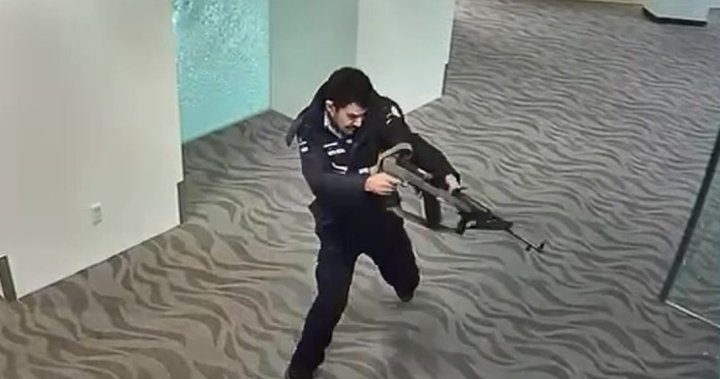A new form of violence referred to as “salad bar extremism” has emerged in Canada, according to an internal government report obtained by Global News. This type of violence is characterized by attacks fueled by a mix of beliefs rather than a single coherent ideology, as seen in the recent Edmonton city hall shooting. The report, released by the government’s Integrated Terrorism Assessment Centre (ITAC), highlights the phenomenon of composite extremism, which is driven by a combination of mainstream social discourse and extremist propaganda. Referred to as mixed, unstable, or unclear extremism, this trend poses a threat in Canada.
The report focuses on the January 23 attack at Edmonton city hall, where a gunman armed with an SKS-style rifle fired shots and lobbed incendiary devices inside the building. The attacker, Bezhani Sarvar, was arrested and charged with multiple offenses, including terrorism charges. Prior to the incident, he had recorded a manifesto touching on various topics ranging from water quality to the Gaza conflict. The report describes Sarvar’s motivations as a mix of ideological and religious themes, combined with personal grievances related to societal issues such as inflation and housing.
The traditional categorization of terrorism into ideologically, politically, or religiously motivated groups is no longer sufficient to capture the diverse motivations of modern extremists. Increasingly, individuals are developing personal worldviews that borrow from different schools of thought, leading to a blend of ideologies in their actions. RCMP Assistant Commissioner Brigitte Gauvin acknowledged this trend, stating that extremists are motivated by a mixture of ideologies and grievances that drive them to commit violent acts. This evolution in extremist motivations poses a challenge for law enforcement and intelligence agencies tasked with identifying and preventing potential threats.
In another incident on July 2, 2020, a former army reservist, Corey Hurren, rammed his truck through the gates of Rideau Hall in an attempt to “arrest” Prime Minister Justin Trudeau. Described as a “politically-motivated armed assault” by a judge, Hurren’s motives ranged from anger over gun laws and pandemic restrictions to financial troubles and conspiracy theories. The ITAC report highlights the difficulty in determining a single driving factor for extremists, as their beliefs often span multiple categories of extremism, blurring the lines between ideological, political, and religious motivations.
The report also notes the complexity of extremism exhibited by groups like Hamas, an Iranian-backed Palestinian terrorist organization that blurs the line between religious and political violence. Hamas’s goal of establishing an Islamist Palestinian state attracts both religiously and politically motivated extremists who may be inspired by the ongoing conflict in Gaza. This interplay between religious and political motivations further complicates efforts to categorize and address extremist threats. As the landscape of extremism continues to evolve, authorities in Canada must adapt their strategies to confront the challenges posed by salad bar extremism and the diverse motivations driving acts of violence in the country.
In conclusion, the emergence of salad bar extremism in Canada presents a new challenge for authorities in addressing the diverse motivations behind acts of violence. The blending of ideologies, grievances, and personal beliefs creates a complex landscape that defies traditional categorizations of terrorism. The incidents at Edmonton city hall and Rideau Hall highlight the need for law enforcement and intelligence agencies to adapt their strategies to counter the evolving threat posed by extremists with mixed, unstable, or unclear motivations. By recognizing the nuances of composite extremism and its impact on national security, Canadian officials can better prepare to prevent and respond to future incidents driven by this phenomenon.













